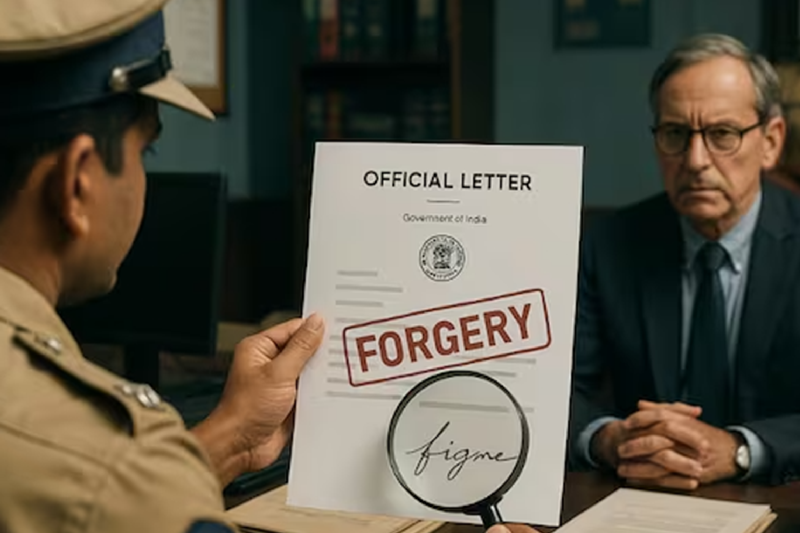
Pune Professor Arrested for Forging Bhatnagar Award Letter: A Deep Dive into the Shocking Incident
In a startling case of academic fraud, a 40-year-old associate professor of chemistry from Pune has been arrested for forging an official letter claiming his selection for the prestigious Shanti Swarup Bhatnagar Award. The accused, Virendra Singh Yadav, hails from Mathura, Uttar Pradesh, and was employed at an educational institute in Wagholi, a suburb of Pune.
The arrest was made following a detailed investigation prompted by complaints from senior officials at the CSIR–National Chemical Laboratory (NCL), who uncovered inconsistencies in the forged document.
The Forged Letter: A Case That Raised Eyebrows
The entire case unraveled when a letter dated September 13, 2025, began circulating in academic circles, suggesting that Yadav had been chosen as a recipient of the 2025–26 Shanti Swarup Bhatnagar Award. The letter appeared highly official — it carried the forged signature of Dr. Jitendra Singh, Union Minister of State for Science and Technology.
However, several researchers and administrators were quick to spot an inconsistency: the Bhatnagar Award had been officially discontinued in 2023, replaced by the Rashtriya Vigyan Puraskar. This critical detail immediately raised suspicions about the letter's authenticity.
CSIR Steps In: Investigation Uncovers the Truth
Once the letter began gaining traction, the Human Resource Development Group (HRDG) of CSIR initiated a formal verification process. They confirmed that:
- The document was completely fake.
- No official announcement regarding awardees had been made for the year.
- The award no longer existed, rendering any new "selections" impossible.
The CSIR team then coordinated with security and administrative officers from NCL, who visited the Wagholi-based institute for further investigation. Upon being questioned, Yadav admitted to presenting the forged document as legitimate.
How the Letter Spread: From Desk to Digital
During interrogation, Yadav claimed he had received the letter from an unidentified man on September 9. He then shared it with his principal and fellow colleagues at the institute.
One colleague took a photograph of the letter and shared it with a contact in Gurugram, who then uploaded it to a professional networking platform — likely LinkedIn. The post attracted attention from senior government officials in Delhi, triggering formal inquiries and eventually leading to the police complaint.
Legal Action and Ongoing Investigation
Following the complaint, Pune Police registered a case and arrested Yadav. He was presented before a local court and has been remanded to police custody until September 26.
The case is being handled by Sub-Inspector Sandeep Karpe, who noted that Yadav is also engaged in oncology medicine research and frequently visits a cancer hospital in Mumbai for his work. However, this aspect of his research career is now overshadowed by the legal consequences of his actions.
Yadav has been charged under multiple sections of the Indian Penal Code, including those related to forgery and cheating. The police are continuing their investigation to trace the origin of the forged document, particularly the unknown person who allegedly handed it over to Yadav.
Academic Integrity Under the Microscope
This incident has brought renewed focus on the importance of integrity in academia, especially at a time when credentials, awards, and recognitions play a crucial role in professional advancement and public trust.
The Shanti Swarup Bhatnagar Award, once considered India’s highest scientific honor for researchers under 45, was discontinued in 2023 as part of a restructuring effort by the Indian government to streamline national recognitions in science. It was replaced with the Rashtriya Vigyan Puraskar, a broader, restructured award system intended to reflect modern research needs.
By attempting to falsely claim a discontinued award, Yadav not only misrepresented himself but also undermined the credibility of legitimate researchers and institutions.
What’s Next?
Authorities are now focusing on the source of the fake letter. Was Yadav acting alone, or was he part of a larger network? Was the forged letter created by a professional forger, or was it an amateur attempt gone too far? Answers to these questions will be key in understanding the full extent of the case.
In the meantime, the incident stands as a cautionary tale about the consequences of academic deceit. As more institutions adopt stricter protocols and digital verification tools for credentials and awards, attempts like this are increasingly likely to be exposed — and punished.
Final Thoughts
While the allure of prestige and recognition may tempt some into unethical actions, this case serves as a clear warning: fraud, no matter how sophisticated, can and will be uncovered. The academic community depends on trust, and breaches like this erode not just individual reputations, but the integrity of the system as a whole.
As the investigation continues, stakeholders across India's research landscape will be watching closely — not just for justice in this case, but for stronger safeguards against future misconduct.



